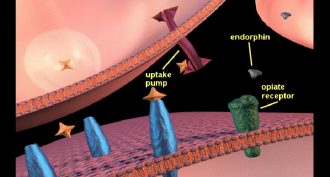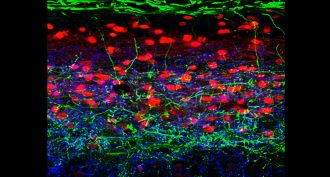Brain
-
 Brain
BrainScientists Say: Amusia
When you can’t carry a tune, you might have amusia, a brain disorder where people can’t tell one note from another.
-
 Health & Medicine
Health & MedicineToo many football hits can change the brain
A former football player who died in his mid-20s had serious Alzheimer's-like damage that doctors are now linking to repeated concussions.
-
 Animals
AnimalsDo dogs have a sense of self?
Dogs don’t know their own reflections in a mirror, but they do recognize themselves from the scent of their own urine, a new study finds.
-
 Health & Medicine
Health & MedicineThe most popular stories of 2015
Our readers love to read about health and wellness. Check out which stories were most popular.
-
 Environment
EnvironmentBrain damage seen in potent-marijuana smokers
Brain scans of people smoking potent forms of pot showed abnormalities in white matter. Studies have not yet looked to see if these changes are also linked with changes in memory, risk of depression or other types of harm.
-
 Brain
BrainMeditation may boost teen memory
Teens who trained in a practice called mindfulness meditation saw improvements in their ability to remember things.
-
 Brain
BrainBubbles may underlie trauma’s brain injury
Many soldiers and accident victims sustain traumatic brain injury that can affect memory, thinking and body movements. New research now studies whether tiny bubbles caused by pressure waves may trigger that damage.
By Sid Perkins -
 Brain
BrainCool Jobs: Getting in your head
Experimental psychologists study animals and people to understand the roots of behavior.
-
 Animals
AnimalsProfile: A human touch for animals
Temple Grandin uses her own autism to understand how animals think. The animal scientist is famous for fostering the humane treatment of livestock.
-
 Brain
BrainWhen every face is a stranger’s face
Some people can’t recognize faces — any faces, even their mother’s. Scientists are working to understand this ‘face blindness’ and help those who suffer from it.
-
 Brain
BrainScientists Say: Neurotransmitters
When brain cells need to communicate, they use chemicals as messengers. These molecules have a special name.
-
 Life
LifeScientists discover itch-busting cells
A study in mice finds the body has a special way of dealing with an itch that’s caused by a light touch. The results could lead to treatments for chronic itch.